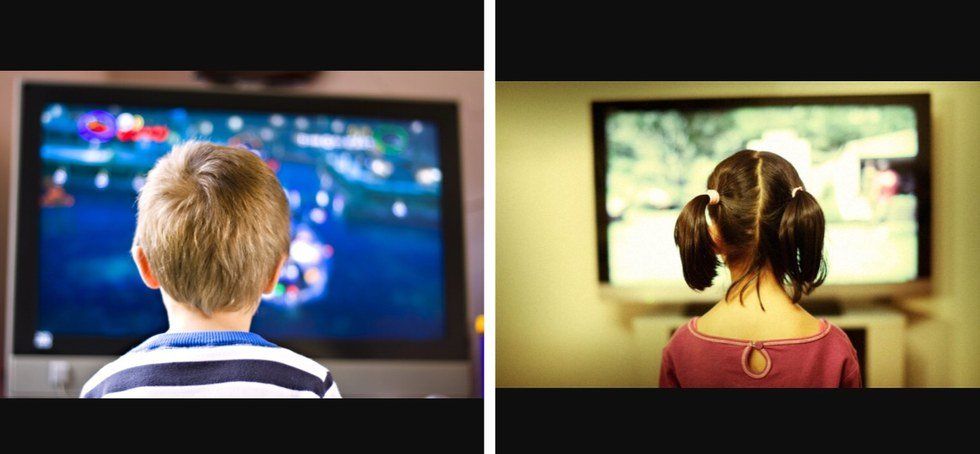Children, on average, watch television more than 28 hours a week. The first two years of life are considered a critical time for brain development. With 2/3 of infants watching TV an average of two hours a day, television grooms them to fit into specific gender roles that are considered norms in our society. Television shows and G-rated films tend to depict more working males than females, which distorts reality. Women now make up almost half of America’s workforce. Depiction of the ‘ideal’ body image also reigns in TV and film. When looking closely at G-rated movies, animated female characters are likely to be shown with an hourglass figure. The perfect example is the Disney Princess ideal body, an unrealistically small waist and large chest. Television can play a significant role in a child's growing beliefs and attitudes about what it means to be male or female in this world. Promoted very consciously and carefully taught to us throughout our lives, "gender roles" include the set of socially defined roles and behaviors reserved for the sex assigned to us at birth.
There are many differences between sex and gender, gender is cultural while sex is biological. Sex refers to the biological differences between males and females, which includes chromosomes, hormonal profiles, along with internal and external sex organs. Gender describes the characteristics that a society or culture depicts as masculine or feminine, so gender role stereotyping is the belief that it is only natural and fitting for males and females to adhere to traditional gender role patterns. The majority of people conform to gender roles from childhood largely because of media. From birth, children are able to quickly learn that a large part of their life deals with masculinity and femininity. Even though many environmental factors influence construction of gender, nothing in biology labels any particular set of behaviors as being inherently right or wrong, normal or abnormal. Children learn to accept gender stereotypes as they are represented on television. This is because these stereotypes are constantly repeated for proper reinforcement. It is clear that there is no solid line between masculinity and femininity, but the media overlooks that. Across G-rated movies and children’s TV shows, males are shown to be strong, athletic, neutral in emotion, and independent. Females are portrayed to be caregivers, delicate, helpless, and wearing their emotions on their sleeves.
Dr. Stacy L. Smith, a researcher at the University of Southern California, Annenberg, conducted a study on gender roles in children’s media. She discovered that there are negative consequences that may occur with exposure to film and television’s view of gender and gender roles. Lack of gender equality in the media may influence children to think that stories about females are not as important as stories about males. It may contribute to the attitude that boys are more important than girls. The media can also affect children’s perceptions of occupations. Occupations are sometimes gender-typed on television, so heavy viewing may reinforce to some children that certain jobs are more or less appropriate for males and females. Exposure to thin and sexy female figures or strong and muscular male figures may affect children’s beliefs about their own and others’ bodies. Finally, exposure to stereotypical portrayals of gender roles in relationships may affect children’s beliefs about interpersonal relationships. Doctor Smith wrote, “It must be noted that media may be contributing to these types of beliefs, or those who hold such opinions may seek out content that confirms their world view.”
From a very young age, children are exposed to film and television that emphasize and reinforce gender roles. This can distort a child’s view of themselves and others whether it is about self-worth, occupation, body image, and/or relationships. Parents need to exercise some degree of control over how much television their children are watching. Also, viewing movies and TV shows with their children and discussing the messages they contain may help reduce some of the negative effects of gender roles in the media. Overall, television and film present a skewed view of gender. Parents can counteract some of the media’s negative influence by communicating with their children.





















